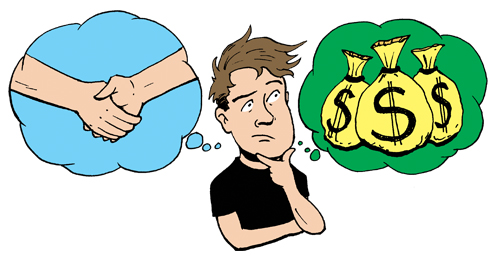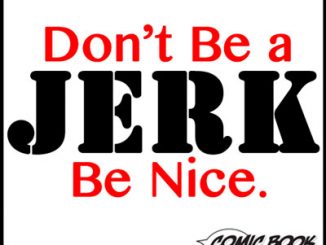
Watch this animated GIF. (Or click this link: http://gph.is/1ZPE2Oj)
Okay, first things first.
- This is an animated GIF of a person who looks like a TV reporter asking a kid a question and the kid starting to cry. We have no idea if this is actually what’s being said.
- We have no idea who created this. It doesn’t look staged, but it could be. If we know who created it, we could ask them about it and credit them.
This video does bring up an important discussion point for comic book creators just like you. Specifically, the ongoing discussion around payment for your art or writing.
As a creator, you may one day desire to be paid for the art you create. There’s no shame in this, but in some ways, society expects artists to create art for art’s sake. This puts an awkward stigma on creatives like you and me.
Not all art is created for commercial reasons. Many people write, draw, paint, sculpt for their own reasons. We won’t go into those here, but it is important to note that not all art is going to be created to garner a paycheck. Many people create art for art’s sake and the personal satisfaction derived from that art.
Museums and libraries feature works of art and writing that are accessible to you at no charge. Some museums have an admission fee, but the Smithsonian museums in Washington DC are famously free, as are many of the other museums in that city. Plus there are free public libraries in every state where you can observe free art and read books for free.
Comics Are Commercial Art
Then there is art that is created for commercial reasons. Comic books are often tied to commercial metrics like sales. This has traditionally been because comics were traditionally (and in many cases) printed content that actually costed someone money to create. You can create comics for the digital screen and monetize those efforts, but when you create for print, it’s going to cost you. Most people will want to sell those printed comics to recoup the cost of their printing investment.
That brings me to you. You can create comics for your own reasons. It may be to improve your craft, to get your idea out there, or just to publish a portfolio. You may not have to get paid, but you may need to pay a collaborator. If the collaborator shares similar goals, you may not have to pay that person, but you may need to give them something that they want in exchange. That may be experience or connections or some other value exchange that makes the hard work to reward ratio feel equitable.
In my career, I’ve worked with many creators. Sometimes I paid them. Sometimes they paid me. Sometimes we just collaborated freely for our own personal/professional reasons.
That brings me back to this animated GIF. If this exchange was real, then it shows the quick and honest reaction a child has to the response of the reporter. This looks like a mix of guilt and shame on the part of this small child, who believes he gave the wrong answer.
Here’s the exchange:
Reporter: Do you make money from your art?
Kid: Yes.
Reporter: Really?
Kid begins to break down, cries, and walks away.
Is making money for your art the “wrong answer”? Obviously it depends greatly on the art, the effort, and the return on investment.
Personal Experience with “Free”
Prior to breaking in as a professional writer, I wrote a lot of free things. Back when I was younger, my goal was to be a professional journalist. To break in as a pro, I needed writing samples and published clips. To get that, I had to write for free.
I knew that the people publishing my work were profiting financially. This is back in the day before the Internet, so print was the main source of publishing and people paid for published materials. The publishers were using my work to help sell magazines and newspapers, but none of that profit was going to me. That said, I was getting value out of it.
After enough published clips, I was able to get work for paid publications. After a while, I cut back on the amount of free work and beefed up the paid work. It was a long-term strategy that eventually paid off for me. It led to my work as a journalist in the comics industry and opened doors to writing actual comic books.
Now that I have established myself as a professional, there’s a certain expectation that I will get paid for my writing. In certain cases, yes, I need to get paid to work on your project. In other cases, I may not need to get paid. It all depends on the value exchange in the opportunity.
As a creator, you don’t necessarily need to get paid to create comics, but you don’t also have to assume that you will work for free. It all depends on what you get out of the effort. Exposure? Connections? Co-creator of a property? Pure pleasure of seeing your work published? These are all highly personal reasons for doing professional or hope-to-be-professional work.
But let’s face it. People don’t always value what we do. There are a lot of people out there ready to exploit your time and talents to benefit their own goals. I’ve been asked to design websites, write articles, and plan publishing strategies for people who have no intention of paying me. I’ve been told “it’ll be good for your portfolio.” Or “you’ll get good exposure.”
If I took the project and did the work, maybe those things were true. Maybe I was just helping out a friend or some other personal reason. It depends.
When someone looks at your writing or art or inking or coloring, you may be faced with this same decision. Do I help this person? Do I need to get paid for this? What do I really want and will this help me get there? Is this worth my time or should I be using my time for something else?
Do I think that you should draw a line in the sand and say that you won’t draw a line unless you’re getting paid? Actually, no. I think there’s value out there for you, but you may not be taking advantage of the opportunities that may (may!) come from doing free or low-paid work.
In my case, I can trace 100% of my paid work to some free work that I did earlier. Specifically, if I had turned down the free work, I would not have had the opportunity to do the paid work. It turned out that these projects weren’t fully “free” because I got something out of it of value. For me, that’s just a fact and I accept it as a strategy that’s worked for me. That said, I’ve turned down free work that I didn’t think would have some sort of long-term benefit for me as a professional creator. And, of course, not all of the things I’ve done for free have actually benefitted me or made me happy.
I still do free work. This website isn’t free. I pay for the domain name, the hosting, and create content for free for you. There are other people who contribute to the website and nobody has ever gotten paid. Everyone who contributes does it for their own reasons. Will there be payment one day? Maybe, I don’t know. In the meantime, I like working on this website and I hope you enjoy it. (If you enjoy it, please sign up for my newsletter!)
Action Plan for Creators
Society loves art, but art for commercial profit seems to make certain people feel uncomfortable. That’s not going to change, so you need to work around this as a creator. You must become comfortable with discussions about money and value and what that means for you and your collaborators.
Determine if you want cash, want printed copies, want co-creator credit, or some other exchange. If you’re working with an established creator, is your goal to get your work in front of editors? If that’s what you want, be sure to express that up front.
Before you start a project, ask questions. Talk things out. Determine if creating comics with someone in the short term will help you reach your long-term career goals. Know what your long and short-term goals are, so that you can work toward them. These are career choices that matter, even if you don’t plan to make comics your career.
Also, be prepared to modify your goals and evolve with the times. When I started as a writer, there was no commercial Internet and no digital comics. These days the concept of “published” has changed dramatically. It will continue to change and morph with new technologies and media channels. Sites like YouTube, Comixology, Amazon, Instagram, Facebook, and Twitter have created new opportunities for sharing creative ideas and publishing your work. If you only have one definition for comics, then you need to look at what’s being published these days by our community.
Only you can determine if a project is right for you and if requires an actual monetary exchange. That’s a decision you’ll have to make.
But when you do make that decision? Don’t cry about it.
PAYING THE BILLS:
Buy stuff on Amazon:
Promo: Kindle Unlimited on Amazon


